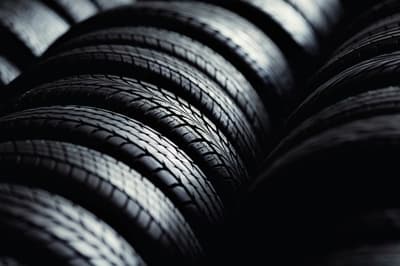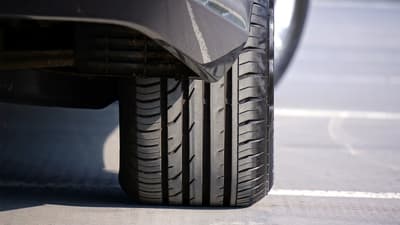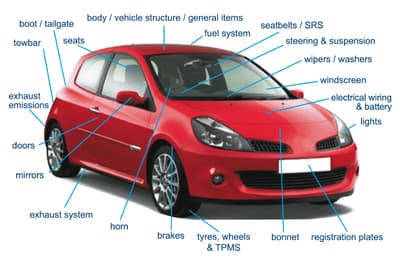UK Tyre Law
What do you know about UK tyre law? In order to protect yourself as a driver, and the pedestrians and road users around you, your tyres must be fit for purpose – and it’s your duty to understand what that means. If your vehicle is deemed to be unsafe by a police or traffic officer, you could be fined up to £2500 and have 3 penalty points applied to your licence.

Each time you use your car, you take the time to check that your mirrors are at the right angle. Your vehicle handbook tells you how to check your engine oil, water level, brake fluid, and more. But what about your tyres? Checking that your vehicle is safe to drive is extremely important and checking your tyres is one of the most important parts of that process.
Knowing what the laws around tyre condition are makes it easier for you to assess when your tyres are in a good state, but when is a tyre illegal? Put simply, tyres are regarded as illegal when they are unsafe to be on the road.
This post covers everything you need to know about illegal tyres, beginning with what parts of your tyres are inspected in an MOT and moving on to talk about each pass criteria in regard to the law.
MOT Tyre Rules

Every car owner will know that MOTs are an annual test of your car’s capabilities that determine whether it is safe to be on the roads. An MOT test will assess several aspects of your vehicle including your engine, wheels, and brakes. It also involves an in-depth assessment of your tyres to ensure that your car is meeting MOT tyre regulations.
Whilst the car is jacked up above ground, the tester will check the wheel bearings by rocking each of the wheels or using mechanical detectors. At this stage, the tester is looking for noise or friction when the wheel turns, as this could be an indicator of damage, distortion, cracks, or missing parts.
The tester will not remove hubcaps and will not test your spare tyre.

Car Parts Tested in MOT, www.gov.uk
During the tyre check section of an MOT, any fractures and welding defects on your wheels will also be found. This can be the cause of incorrectly fitted tyres or wear between the wheel and the hub. Additional checks include that tyres fitted on the same axle are of the same structure and size and that the Tyre Pressure Monitoring System is in full working order (as of 2012, a broken TPMS will result in an MOT fail).
Legal tyre condition
Tyres must be at least at the minimum legally required condition or the car is at risk of failing its MOT or having an on-the-spot fine of up to £2500 imposed if caught driving on the road.
The minimum legally required condition means that tyres cannot be visibly damaged by distortion or cracks, and that they must be inflated to the correct tyre pressure. Regular maintenance on your tyres can save you money further down the line, as well as keeping tyres compliant with UK car tyre law.
It’s possible to check the condition of your tyres easily. Take a walk around the vehicle and look carefully at each tyre. Are there any cuts, tears or bulges? You should also check for stones or nails in the tyres, as well as damage or wear to the sidewall.
Legal car tyre tread
Tread depth is important on any vehicle, as it increases friction with the road and therefore reduces the risk of accident. Not only can you receive a fine and points on your licence for not having the legal tyre tread, it’s also extremely dangerous.
Depending on the type of vehicle that you have, the recommended tread depth will vary. Tread must be of the correct depth across the middle ¾ of the tyre, and all the way around the tyre.
| Vehicle type | Recommended tread depth |
| Cars, light vans and light trailers | 1.6mm tyre tread (check with 20p test) |
| Motorcycles, large vehicles and passenger carrying vehicles | 1mm tyre tread (check with tyre tread indicators or a depth gauge) |
| Mopeds | Visible tread pattern |
If you have not maintained legal car tyre tread depth, your tyres can lose traction with the road in wet conditions causing them to skid on top of the water instead, known as aquaplaning. When your tyres aren’t in contact with the road, it’s impossible to accelerate, brake, or steer effectively. This is a scary situation that’s easily avoidable if the legal car tyre tread is maintained.
Tyre tread depth 20p test
What’s the best way to check your car’s tyre pressure? A tyre tread depth gauge is the most accurate way, but you don’t have access to one, the the 20p test is an acceptable workaround.
By placing a 20p, edge down, into the tread of your tyres, you can see if they meet the legal requirement or not. If the outside edge of the 20p is fully covered by the tread, it’s deep enough. If you can see some of the outside edge above the surface of the tyre, your tread depth is below the minimum.

Legal tyre pressure
The majority of new cars are fitted with a tyre pressure monitoring system (TPMS) to assist you in the monitoring of your tyre pressure. On most TPMS systems, sensors attached to the wheel will monitor the pressures inside the tyres and will alert the driver with a warning light if the pressure falls below an acceptable level. If the TPMS isn’t working, it could mean that the sensors or battery needs replacing – which is a relatively simple fix.
It’s a little-known fact that the air pressure within your tyres is the most important factor in their performance. Pressure will affect the tyre’s overall safety, including speed, load carrying, handling response. Underinflated tyres will result in worse fuel economy, and your car will also emit more CO2.
You should check your car’s tyre pressure when they are cold. This usually means at the beginning of the day before you’ve driven anywhere. Check your tyre pressures at least once a month – for convenience’s sake, some people prefer to check at the petrol station each time they fill up. Each vehicle has its own guidelines regarding what the safe tyre pressure is. Your tyres should be properly inflated in line with these specific recommendations.
25 Jun 2019
Did you enjoy this blog post?
|
14 people found this review helpful
